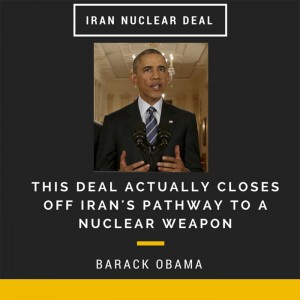 On the eve of it taking effect, Truthout shares Amy Goodman’s report on the Iran nuclear deal that has been negotiated by President Obama.
On the eve of it taking effect, Truthout shares Amy Goodman’s report on the Iran nuclear deal that has been negotiated by President Obama.
JAVAD ZARIF: Let me begin by expressing my appreciation to everybody, to those who started this process and those who have continued this process in order to reach a win-win solution on what, in our view, was an unnecessary crisis, and open new horizons for dealing with serious problems that affect our international community. I believe this is a historic moment. We are reaching an agreement that is not perfect for anybody, but it is what we could accomplish, and it is an important achievement for all of us. Today could have been the end of hope on this issue, but now we are starting a new chapter of hope.
AMY GOODMAN: Under the deal, sanctions on Iran could be reinstated in 65 days if the deal is violated. A UN weapons embargo is to remain in place for five years, and a ban on buying missile technology will remain for eight years. Despite these measures, Israeli Prime Minister Benjamin Netanyahu called the deal a “bad mistake of historic proportions.”
We go now to Vienna, where we’re joined again by Flynt Leverett, author of Going to Tehran: Why America Must Accept the Islamic Republic of Iran. He’s a professor of international affairs at Penn State; served for over a decade in the US government as a senior analyst at the CIA, a Middle East specialist for the State Department and as senior director for Middle East affairs at the National Security Council.
FLYNT LEVERETT: … Iran undertakes regarding certain limits on its nuclear activities that will address nonproliferation concerns that the United States and some other countries have had. As an analyst, I have personally never been persuaded that Iran was seeking to build a nuclear weapon, but for those who are concerned about that possibility or that risk, I think this is a very good deal from a nonproliferation standpoint.
At the same time, in terms of nuclear commitments, I think Iran has achieved something very significant here, which is basically a recognition of the reality that states have a right to a peaceful use of civil nuclear technology in all respects. This is not a right that is granted by the Non-Proliferation Treaty; it is a sovereign right that’s recognized by the treaty. From an Iranian perspective, the United States and the Security Council tried for years to deny Iran that right. And now, without Iran having sacrificed it, the international community is recognizing that right, and I think that’s an important step on the nonproliferation front, as well.
I say, the war hawks have profited enough for 1000 lifetimes. Let’s give peace a chance.
